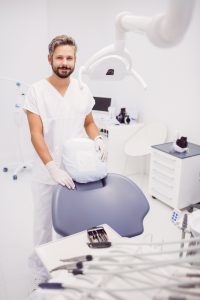All types of restorative dentistry will be carried out by a specialist known as a prosthodontist. These professionals diagnose and treat a variety of oral conditions before carrying out oral rehabilitation procedures which correct problems linked to missing or deficient teeth and maxillofacial tissue issues.
Similar to general dentists, prosthodontists also perform tooth replacements and restorations with artificial materials that mirror the look, shape and function of each patient’s own natural teeth. Their primary function as a prosthodontist, however, is to fix and replace teeth.
Some major reasons for patients to have dental restorations or tooth replacements include:
- The loss of teeth because of age, medication use or gum disease
- Teeth which are either entirely or partially missing
- Severe decay of the teeth
- Tooth damage because of injuries and trauma
- Teeth which have been cracked and chipped
- Worn down teeth
- Discolored teeth
- Teeth which have been extracted and which require replacement
- Teeth which are either uneven or misaligned
Which Qualifications Must Prosthodontists Have?
Prosthodontists undertake an ADA-accredited graduate program for prosthodontic treatment. In order to qualify, they have to have first been awarded a bachelor’s degree before studying for at least four years at dental school. Following this, they must then have 3 additional years of residency training. Furthermore, prosthodontists have to carry out keeping up to date with all recent developments in their sector so they are able to obtain recertification every eight years.
Dental Restorations and Oral Rehabilitation Treatment Options
Prosthodontists usually spend most of their time diagnosing oral health problems before treating and restoring patients’ teeth with artificial devices like veneers, crowns, bridges and dentures.
Dentures
There are many restorative treatments available for prosthodontists to use, however dentures are a very common choice. If someone has lost either all or some of their teeth because of gum disease, injuries or decay, the missing teeth are able to be replaced with artificial ones. Dentures fill out the facial profile of the patient to improve their appearance. They also make eating, chewing and talking normally possible. Several types of dentures can be used to suit the needs of each patient. There are complete, fixed-partial, removable, immediate and implant-based dentures, all of which can help different kinds of patient.
Porcelain Veneers
These shells are thin, tooth-colored, coverings that correct crooked, damaged, misaligned, or discolored natural teeth. These are permanent restorations and they change the length, color, function, size or shape of the patient’s teeth. Prosthodontists specialize in undertaking porcelain restorations. Usually, it is porcelain that is used when making veneers since it resists stains effectively when compared with composite veneers. Also, when cared for correctly, porcelain veneers may last for a very long time – often up to 15 years.
Dental Crowns
Artificial dental crowns are tooth-colored caps that fit perfectly over damaged teeth to restore their natural shape, appearance and function. Crowns can either be made out of porcelain, composite resin, ceramic or metal depending on each individual patient’s preferences or requirements. Dental crowns can serve several functions in restorative dentisty. They can restore discolored, weak, worn or cracked teeth, or can protect teeth from being damaged when they’re placed after a root canal treatment.
Dental Implants
When patients are missing a tooth because of injury, extraction or decay, dental implants may be used for replacing it. These are sometimes called artificial tooth roots. In shape, they are similar to a screw, and they are placed in a surgical procedure that involves inserting the implant into the patient’s jawbone so that it can bond naturally with the bone. Usually, patients have dental implants as they have lost their tooth because of decay. Nevertheless, sometimes implants become necessary when a patient suffers from trauma, an injury, or periodontal disease. They are also sometimes used if teeth have been damaged because of medication use or old age.
Fixed Dental Bridges
Dental bridges are a fixed and permanent type of restoration to replace a number of missing teeth or a single missing tooth. Similar to dental implants, bridges are used for replacing teeth which are missing because of extraction, injury, disease and decay. Typically, such restorations are made from a combination of metal and porcelain or perhaps porcelain alone depending on the amount the patient wishes to spend and what outcome is desired. For serious cases, prosthodontists are able to position a number of bridges so the patient’s entire mouth can be fully rehabilitated. There are four dental bridge types offered by a prosthodontist – implant-supported, traditional, Maryland and cantilever bridges.
Dental Screening
Prosthodontists don’t just restore teeth for patients with missing, damaged and extracted teeth. They also offer dental screening to spot common oral problems such as TMD, obstructive sleep apnea and oral cancers. Although prosthodontists don’t treat every one of these conditions, they’re able to provide bite rehabilitation or splints to treat TMJ (temporomandibular joint disorder). When a prosthodontist diagnoses a patient with one of these conditions, patients typically need to go their an oral surgeon, general dentist or doctor to obtain the necessary treatment.
TMD
TMD or Temporomandibular joint disorder is a temporomandibular joint and muscle disorder that results in pain and dysfunction to the patient’s facial muscles and jaw itself. Anyone suffering from TMD struggles in controlling jaw movements and often have earache and headaches together with discomfort whenever closing or opening their mouth.
Obstructive Sleep Apnea
When a patient has a blockage in their upper airway as they sleep, their breathing will stop then start again during the night. There are a number of causes for this condition including bruxism (or teeth grinding), cavities or jaw issues and sufferers typically snore loudly and very frequently. Also, they experience other symptoms like morning headaches, daytime sleepiness, poor concentration levels and memory loss.
Oral Cancer
Oral lesions like ulcers or mouth sores are often the first sign of oral cancers. They may appear anywhere on the palate, mouth, throat, tongue or lips but, in many cases, such lesions won’t be cancerous. Prosthodontists can carry out an oral cancer screening which involves checking the size, symptoms and shape of the lesion as well as its history so they can decide whether it is cancerous, pre-cancerous or non-cancerous.

